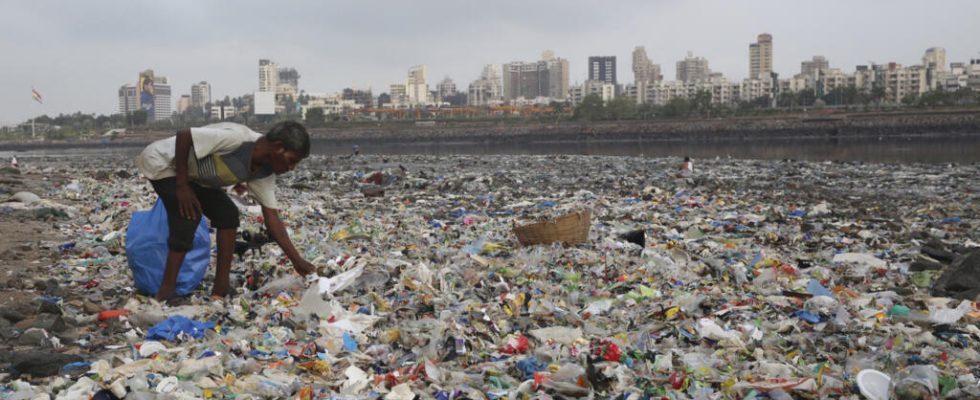The second negotiation session for a future international treaty to put an end to plastic pollution begins this Monday in Paris at the premises of Unesco and is due to end on Friday June 2. But the debates promise to be tense.
Negotiators from 175 states, as well as representatives of NGOs and industries, are meeting in Paris on Monday for five days of discussions under the aegis of the United Nations Environment Program (UNEP). Objective of these negotiations: to find common objectives for an international treaty against plastic pollution. Despite an alarming report, the debates promise to be tense. Because if all the States agree to say that it is necessary to fight against plastic pollution, they are far from agreeing on the extent of the efforts to be made.
On the one hand, the most ambitious countries gathered within a coalition chaired by Norway and Rwanda. There are members of the European Union, Canada, Japan and Senegal. They demand the reduction of production, in particular of single-use plastics, the improvement of recycling and reuse, but also the prohibition of certain dangerous chemical additives and the establishment of a polluter-pays principle.
On the other, less ambitious countries, but which weigh heavily on the international scene. Among them, the United States, China, India, or even Saudi Arabia and other oil-producing countries, the raw material from which plastic originates. They do not want to penalize their economy. No way for them to reduce production; it is rather on the treatment of waste that they want to concentrate their actions. These countries are also reluctant to have a treaty that is too restrictive and to have to report to the UN on common and strict objectives.
Also to listen: Frequency Asia – Plastic pollution in Asia: “There is no global approach”
The involvement in this discussion process of the plastics industry, which weighs billions of dollars and millions of jobs, is also causing concern among NGOs. About 175 of them, led by Greenpeace, wrote to UNEP listing a series of measures against ” the undue influence of petrochemical companies in the negotiations. Their representatives, in particular the European association Plastics Europe, will be present at UNESCO, where all professional, scientific or associative observers will not be able to enter each day, however, for lack of space.
It’s really not normal that they are there in the negotiation space. Because their objective is to perpetuate the extraction of oil and gas, to continue to manufacture as much plastic as possible.
Joëlle Hérin, expert with Greenpeace
One credit card per person per week
The stakes of these negotiations are high as plastic, derived from petroleum, is everywhere: in packaging, clothing fibers, construction equipment, medical tools… And its annual production, which has more than doubled in 20 years to reach 460 million tonnes (Mt), could still triple by 2060 if nothing is done.
Also to listen: It’s not windy – Plastic: it’s overflowing!
A situation that is all the more worrying since two-thirds go to waste after just one or a few uses and less than 10% of plastic waste is recycled. Waste of all sizes is thus found at the bottom of the oceans, in the pack ice, the stomachs of birds and even at the top of mountains. Microplastics have been detected in blood, breast milk or placenta. A study commissioned by the WWF at the University of Newcastle in 2019 showed that an individual consumed an average of five grams of plastic particles per week, the equivalent of a credit card.
Plastic is also a problem for its role in global warming: it represented 1.8 billion tonnes of greenhouse gases in 2019, 3.4% of global emissions, a figure which could more than double by 2060, according to the OECD. If plastic were a country, it would be the fifth largest emitter of greenhouse gases in the world. ” The effects of plastic is both the production from fossil fuels, therefore oil and gas, but it is also all the additives which are very toxic and very harmful and which are therefore very bad for the environment and for our health. More than 700 species of marine animals are threatened by plastic pollution “, warns Juliette Franquet, director of the NGO Zero Waste France, at the microphone of RFI.
As host country for this second round of negotiations, France will lead the discussions. It will therefore have to succeed in reconciling diverging opinions, dealing with petrochemical industry lobbies and environmental activists. The idea is to be able to outline the main guidelines, or even a first draft of the text, before the next negotiation sessions. There will be at least three more before a final treaty, possibly by the end of 2024.
(And with AFP)
